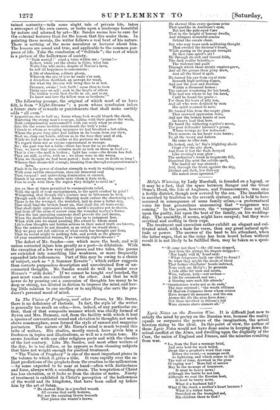In The Vision of Prophecy, and other Poems, by Mr.
Burns, there is no deficiency of rhetoric. In fact, the style of the writer is generally too much an echo,—less, indeed, of any particular au- thor, than of that composite manner which was chiefly formed of Byron and Mrs. Hemans, and, from the facility with which it lent a species of conventional sound and elevation to thoughts not much above commonplace, soon formed the style of annual and magazine poetasters. The nature of Mr. Burns's mind is much beyond this tribe of writers. His studies, mostly sacred, have given him a freshness in topics and illustrations, as well as a certain tone. He seems familiar with our older religions poets and with the classics of the last century. Like Mr. Sandes, and most other writers of the day, he is too diffuse, or he appears so from choosing subjects that have not weight enough for poetical treatment. "The 'Vision of Prophecy" is one of the most important pieces in the volume to which it gives a title. It runs rapidly over the sa- lient predictions of the prophets from the creation to the millennium —by some expected to be near at hand—often with distinctness and force, always with a sounding strain. The temptation of Christ has less elevation, or it looks so from the choice of metre. Nicety of treatment is exhibited in Christ's perception of the hollowness of the world and its kingdoms, that have been called up before him by the art of Satan.
"He showed Him in a jewelled wreath All crowns that earth bestows, But not the rankling thorns beneath That pierce the wearer's brows. He showed Him every specious prize That sparkles in Ambition's eyes, But not the pale-eyed Care That in the height of honour dwells, And whispers mournful oracles Behind the ourule chair.
But who may trace each saddening thought That swelled the Saviour's' heart, While gazing on the pageant wrought
By that false spirit's art?
He through its rich and tissued folds,
The dark reality beholds,—
The violence and guilt
Through which these stately empires grew,.
And all the groans their glory drew, And all the blood it spilt.
Ho turned his eye from royal state Beneath high-arching domes, And saw the poor and desolate Within a thousand homes: The outcast wandering for his bread, Who had not where to lay his head,
Until he found the grave—
For them his tears of pity ran, And all who were despised by man His spirit yearned to save.
He turned him from the empty glare That crowned oppression wore, And saw the broken hearts of care Its heavy load that bore. He heard the withering captive's moan, The poor defrauded labourer's groan, Whose wrongs no law redressed: Their sorrows on his heart were borne ; To all the weary and forlorn He came to offer rest.
He looked, and, lo! Sin's blighting shade Crept o'er the airy show, And from it fast the flush decayed Like evening's rosy glow : The enchanter's wand in fragments fell, Dissolved like mist the subtile spell, The loaded air was cleared ;
And1 through the blank against the sky,
Distinct and dark, low Calvary His naked cross upreared."


































 Previous page
Previous page